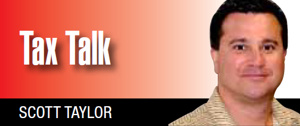It goes without saying that a Tax Talk column in April should be about personal income tax returns. Of course, I dedicated my last two columns to tax tips and ideas about how to reduce the tax you owe.
And so this month I find myself turning to recent conversations with clients for inspiration.
While most of the tax questions I get are related to trucking, clients have a lot more going on in their lives than hauling freight. We do tax returns for clients’ spouses and children. We pretty much see everything.
Consider the topics I’ve talked about with clients in the last few weeks:
Can I deduct my…?
Textbooks: Textbooks are not a standalone deduction. They are part of the education deduction for students of qualified institutions and there is a set amount per month based on the number of months the student is parttime or full-time. So those textbooks your kids bought at the school book store are not deductible, and nor are the books your wife bought for that course she took. If you don’t have a T2202 in your hand, there is no textbook deduction.
Parking at the hospital: Yes, it’s expensive; yes, you’re stuck with the hospital lot unless you want to hike a mile; and no, parking is not an allowable deduction. That is, unless you had to travel at least 80 kms one way from your home to obtain medical services. If that’s the case, then accommodations, meals, and your vehicle expenses are deductible as well.
Cell phone: Unless your employer completes form T2200 verifying that you are required to have a cell phone, you cannot deduct this expense.
Commuting and uniforms: Driving to the truck, yard, or office is a personal expense and is not deductible whether you are an employee or selfemployed. Additionally, as an employee, you cannot deduct the cost of special clothing you wear or have to wear for your work.
Meals: Let’s not forget that there are two deduction rates for meals eaten while you’re on the road.
All meals claimed using the simplified method (ie. your logbooks) are calculated at $17 per meal. You can claim 50% of that amount unless you qualify as a long-haul truck driver, in which case you can claim 80%.
A long-haul truck driver is defined as an employee whose job is transporting goods in a long-haul truck that has a GVWR of more than 11,788 kgs; is away from his home municipality or metro area for at least 24 hours; and travels at least 160 kms from the establishment to which he regularly reports to work.
Basically, if you’re home every night, your meal expense deduction is 50%. Even then, you must have been away for 12 consecutive hours from your municipality or metropolitan area in order for the expense to qualify.
I’m late…
Two years ago, we helped an owner/operator file GST/HST and income tax returns for 2005 to 2007. Recently, he came to us about preparing his 2008 to 2010 returns. While reviewing everything he sent to us, I found Notices of Assessment for his GST/HST account for 2005 to 2007. Everything had zeros on it. CRA had denied his claims for GST/HST paid on expenses because they were more than four years old.
We warned him that this could happen. This guy does a lot work in Canada and he was eligible for almost $12,000 in claims if only he had filed sooner. Now, as we start work on his claims for 2008 and 2009, we’re going to have to tell him that they’re too old as well.
CRA doesn’t mess around when it comes to deadlines. The last day to submit your 2013 personal income tax return is April 30.
If your return is late, there’s a minimum 5% penalty on the balance owing plus 1% per month for a maximum of 12 months.
If you have filed late before, the penalties may be higher.
Even if you can’t afford to pay the balance, filing your return on time can save you penalties and fees. You’ll also be in a better negotiating position with CRA regarding a payment plan.
Preparing your personal tax return may be a once-a-year thing but tax planning and managing your finances takes constant effort. It’s not most peoples’ idea of fun. However, the commitment is worth it. We all work too hard to give up opportunities to reduce the amount of tax we owe. There’s more to life than trucking
Scott Taylor is vice-president of TFS Group, providing accounting, bookkeeping, tax return preparation, and other business services for owner/operators.
Learn more at www.tfsgroup.com or call 800-461-5970.
